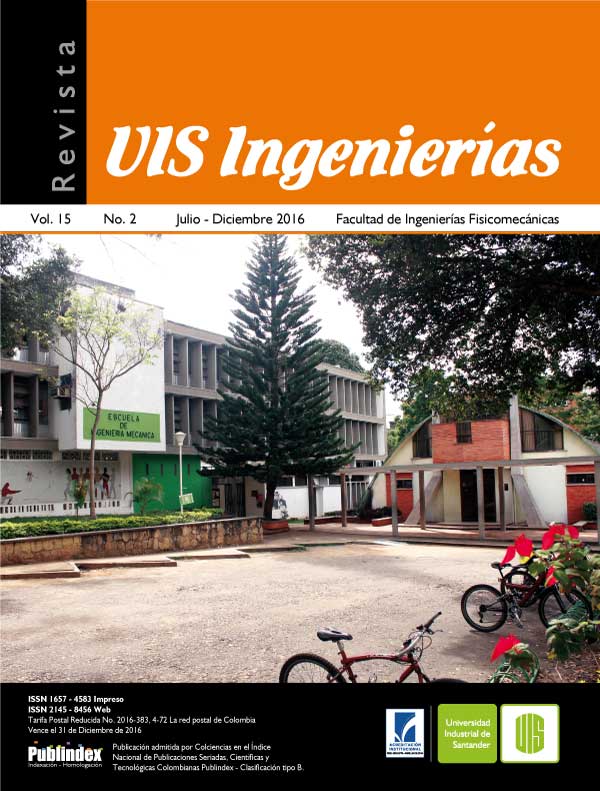Optimal power management in a grid-connected microgrid, based on Multi-Objective Genetic Algorithm MOG
Published 2016-05-25
Keywords
- energy management system (EMS),
- microgrid,
- multi-objective optimization,
- multi-objective genetic algorithm (MOGA),
- multi-objective optimization evolutionary algorithms (MOEA)
- optimal power management. ...More
How to Cite
Abstract
Microgrids are a revolutionary concept to face some problems of the big and centralized power systems. Although emerging concept promises to offer numerous benefits, also presents new challenges in control and operation. One of the most important challenges is to make optimal power management into the microgrid. This power management must ensure maximum use of available resources; at same time it must reduce environmental contamination. Based on Multi-Objective Genetic Algorithm MOGA, this paper presents one strategy to make optimal power management in a grid-connected microgrid. The strategy runs over two conflictive objectives: to reduce microgrid operational cost and greenhouse emissions. Simulation results show benefits using the MOGA strategy, in comparison with a strategy of full importation from main grid. In this manner, the proposed strategy is a good option to build the optimizer kernel of energy management system EMS in microgrids.
Downloads
References
- R. Carballo et al., “Design and Implementation of a Three-Phase DC-AC Converter for Microgrids Based on Renewable Energy Sources,” IEEE Latin America Transactions, vol. 11, núm. 1, pp. 118-124, feb. 2013. DOI 10.1109/TLA.2013.6502788.
- Y. Muñoz y A. Ospino, “Selecting the optimal energy mix and sizing of a isolated microgrid,” Revista inge@UAN, vol. 4, núm. 7, pp. 59-67, jul-dic. 2013.
- G. Corso, et al. “Multi-objective long term optimal dispatch of distributed energy resources in micro-grids,” en UPEC, 45th International, 2010, pp.1-5.
- R. Jaganmohan Reddy et al., “Distributed ANNs in a Layered Architecture for Energy Management and Maintenance Scheduling of Renewable Energy HPS Microgrids,” IEEE Power and Energy Society General Meeting, 2012, pp. 1-6. DOI: 10.1109/APCET.2012.6302067
- P. Faria et al., “Modified Particle Swarm Optimization applied to integrated demand response and DG resources scheduling,” IEEE Transactions on smart grid, vol. 4, núm. 1, pp. 606-618, mar. 2013. DOI: 10.1109/TSG.
- 2235866.
- D.M. López, “Gestión óptima de la potencia eléctrica en microgrids, basada en inteligencia computacional,” tesis de maestría, Esc. Ing. Sist. Y Comp., Univalle, Santiago de Cali, 2013.
- M.B. Shadmand y R.S. Balog, “Multi-Objective Optimization and Design of Photovoltaic-Wind Hybrid System for Community Smart DC Microgrid,” IEEE Transactions on Smart Grid, vol. 5, núm. 5, pp. 2635-2643, ago. 2014. DOI: 10.1109/TSG.2014.2315043
- H.A. Gabbar et al., “Performance optimization of integrated gas and power within microgrids using hybrid PSO–PS algorithm,” International Journal of Energy Research, vol. 40, núm. 7, pp. 971–982, jun. 2016. DOI: 10.1002/er.3493
- H. Kumar Nunna y S. Doolla, “Multiagent-Based Distributed-Energy-Resource Management for Intelligent Microgrids,” IEEE Transactions on Industrial Electronics, vol. 60, núm. 4, pp. 1678-1687, abr. 2012. DOI: 10.1109/TIE.2012.2193857
- M.J. Santofimia Romero, X.D.T. García y J.C. López, “Técnicas de Inteligencia Artificial aplicadas a la Red Eléctrica Inteligente (Smart Grid),” Novática, núm. 213, pp. 29-34, sep-oct 2011.
- European Comission, “The 2020 climate & energy package,” Disponible en: http://ec.europa.eu/clima
- /policies/strategies/2020_en
- X. Wang, J.M. Guerrero y Z.Chen, “Control of Grid Interactive AC Microgrids,” IEEE International Symposium on Industrial Electronics, ISIE, jul. 2010, pp. 2211-2216. DOI: 10.1109/ISIE.2010.5637807
- J.M. Guerrero, J.C. Vásquez y R. Teodorescu, “Hierarchical control of droop-controlled DC and AC microgrids — a general approach towards standardization,” IECON '09. 35th Annual Conference of IEEE, (Porto), 2009, pp. 4305-4310. DOI: 10.1109/IECON.2009.5414926
- W. Su y J. Wang, “Energy Management Systems in Microgrid Operations,” The Electricity Journal, vol. 25, núm. 8, pp. 45-60, oct. 2012. DOI: 10.1016/j.tej.2012.09.010
- S. Diaf et al., “A methodology for optimal sizing of autonomous hybrid PV/wind system,” Energy Policy, vol. 35, núm. 11, pp. 5708–5718, nov. 2007. DOI: 10.1016/j.enpol.2007.06.020
- Guía para el desarrollo de una pequeña central hidroeléctrica, European Small Hydropower Association (ESHA), 2006.
- A.J. Wood y B.F. Wollenberg, Power Generation, Operation and Control, 2a ed. New York: Wiley, 1996, p. 593.
- Cummins Power Generation, “Generator set data sheet 10 kW standby DSKAA Diesel EPA”.
- A.M. Azmy y I.Erlich, “Online optimal management of PEM fuel cells using neural networks,” IEEE Trans. Power Deliv., vol. 20, núm. 2, pp. 1051–1058, abr. 2005. DOI: 10.1109/TPWRD.2004.833893
- R. Noroozian y H. Vahedi, “Optimal management of MicroGrid using bacterial foraging algorithm,” 18th ICEE, 2010, pp. 895–900. DOI: 10.1109/IRANIANCEE.2010.5506951
- Metodología para definir el índice de perdidas reconocidas en la actividad de distribución, Comisión de Regulación de Energía y Gas (CREG), 2002.
- M. Pipattanasomporn, M. Willingham y S. Rahman, “Implications of on-site distributed generation for commercial/industrial facilities,” IEEE Trans. On Power Systems, vol. 20, núm. 1, pp. 206–212, feb. 2005. DOI: 10.1109/TPWRS.2004.841233
- C.M. Fonseca y P.J. Fleming, “Genetic Algorithms for Multi-Objective Optimization: Formulation, Discussion and Generalization 5th International Conf. on Genetic Algorithms, 1993, pp. 416-423.

